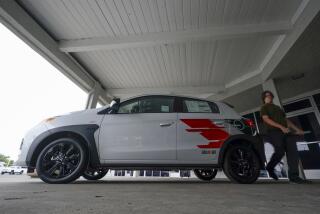U.S. Car Prices Will Remain Stable, Study Says
- Share via
ANN ARBOR, Mich. — U.S. car sales are likely to grow by less than 1% a year through the year 2000 and prices should remain steady, leading to heated competition for buyers, according to a University of Michigan study released Friday.
The Delphi V forecast also found that auto industry officials do not expect cars of the 1990s to be as technologically advanced as they had predicted in earlier studies.
The biennial report by the university’s Center for the Study of Automotive Transportation said the domestic market will remain mature through the next decade, with more products offered to a relatively fixed set of customers.
The Delphi forecast, based on questionnaires sent to about 750 executives, automotive engineers, consultants and others associated with the industry, predicted that passenger car sales in the decade will grow by less than 1% a year from 10.1 million in 1990 to 10.9 million in the year 2000.
At the same time, prices are likely to remain stable. A typical $14,000 car today will cost $15,000 in 1995 and $15,900 in the year 2000. The typical $15,000 import model will rise to $17,000 in 10 years, the survey estimated.
The key elements that will mark competition in the next decade are quality, cost and product innovation, the study said. “Both world-class cost and quality are considered as just entrance tickets to the international competition of the future,” the forecast noted.
It said the intensity of competition will accelerate and the winning companies will be those able to develop strong relationships with their customers. The forecast predicted that auto makers will have to think increasingly in terms of quality for the life of their products, not just until the warranty runs out.
In 1987, at least one-third of Delphi participants thought plastic could replace steel by 1995 in key body parts such as hoods, fenders and rear panels. This year, 20% of respondents or fewer thought plastic would be used in important parts of the auto body.
In another area, the new study predicted that collision warning systems are the most likely safety feature to be incorporated in cars during the next decade. Other expected safety improvements include improved exterior and interior crash protection, anti-lock brake systems and radar brakes.
The study found that many industry officials believe that the percentage of foreign parts on cars built by the Big Three U.S. auto makers will rise if no domestic content legislation is passed.
Estimating that 21% of parts on U.S. cars are now foreign built, the study predicted that the figure will rise to 26% by 1995 and 30% by 2000. More parts will be produced in Mexico and South America, while fewer parts will be imported from Japan, the study said.






